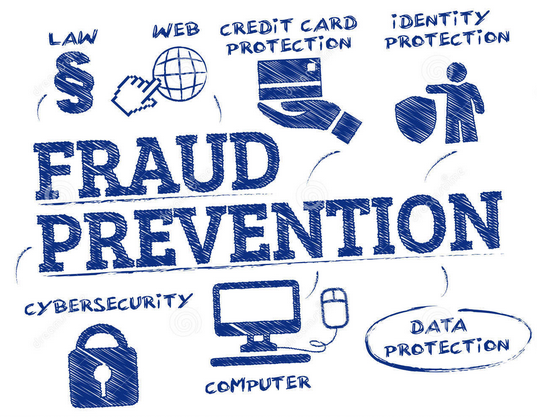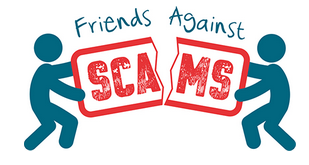
Protect yourself from scams
How can we protect ourselves, friends and family against scams?
- Identity fraud:
Your personal information – your name, address and bank details – is very valuable to criminals. To stay safe, always:
Shred or tear into small pieces anything with personal information on it before you throw it away or recycle. Be very wary of unsolicited phone calls, letters or emails from your bank asking you to confirm your personal details, password or security numbers. Don’t click on links sent in emails unless you’re sure you can trust the person who sent them. Never reply to unsolicited texts, emails or letters. If you do, you may be put on a scammer’s ‘suckers list’ and targeted in the future.
- ‘Courier fraud’
A scammer persuades you on the phone to hand over your bank card to a courier or taxi driver and they often say they’re from your bank or the police. They may ask you to give them your card and PIN, set up a ‘safe’ account, or buy expensive goods like watches or mobile devices and hand these over to them.
Remember – this is a scam. Banks or the police never ask you to do this.
- Lottery scams
Fraudsters contact you by post or email saying you’ve won a cash prize in an international lottery, sweepstake or prize draw; often Spanish, Canadian or Australian lotteries, but there are others. You’re told to keep your good luck a secret and to respond quickly to claim your ‘winnings’. But there’s no prize money. Often the winner’s certificate looks so convincing that people are taken in. You’ll be asked to pay admin fees such as taxes, legal costs, or banking fees. Each time the scammers will give you reasons why your winnings can’t be paid out – unless you make another payment to reach the ‘next stage’.
Don’t make any payments or give your bank details. Scammers can use them for identity fraud.
- Investment fraud
Scammers tend to cold-call the over-55s offering high-yielding (but unregulated) investments like wine, land, carbon credits, gold or diamonds. These scammers often seem believable because they know a lot about you and build a ‘friendly’ relationship with you.
Remember – if it seems too good to be true, it probably is.
- Dating sites and chatrooms
Scammers exploit your emotions to befriend you, often making you believe that you’re in a relationship with them. They then try to con money out of you.
They’re clever and convincing. Don’t let feelings of embarrassment stop you from reporting a scam. Remember, it’s often smart, confident people who get scammed. So if in doubt, always contact the police.
- Rogue Traders
- Be cautious; if a trader knocks at your door, do not agree to on the spot house repairs without taking advice.
- Be wary of special offers or warnings that your house is unsafe.
- Don’t allow anyone to pressure you into agreeing to have work carried out. If you ask them to leave and they don’t, contact the police on 999.
- Do not make snap decisions. If you feel that any work needs carrying out on your property, take time to talk to family or neighbours before you make a decision.
- Don’t ever go to a bank or cash point with a trader; legitimate traders would never do this!
- Computer software fraud
Each year, Trading Standards receive thousands of complaints about uninvited traders and a large majority of these relate to home maintenance work such as roofing, tarmac-ing and paving, garden and tree surgery, insulation, general building work, burglar alarms and other services.
The work or service offered can sometimes be unnecessary, overpriced, of a poor standard or not done at all. Typically they have no formal training to carry out the work offered and some may have links with distraction burglars.
It is important that people have the confidence to say no to doorstep traders and take the time to think about the service being offered.
The following is advice on how people can avoid being scammed by rogue doorstep traders:
If you have an experience with a rogue trader, please report it by telephoning 101 and ask for your Local Crime Reduction Officer, or click here if you would like to report it online (if you live within the PE Postcode area) and we can pass it on to the relevant people on your behalf.
For live incidents where the rogue trader is still at the property, or is due to return, contact the police on 999. The police have a protocol for dealing with these incidents and welcome your contact.
Scammers contact you to say there’s a problem with your computer. They say they’ll ‘fix’ the non-existent issue – for a fee. They’ll get you to hand over remote access to your computer and provide your bank payment details. They then take large amounts of money out of your account. Fraudsters often pretend to be working for Microsoft.
The average loss is £600 and the average age of people scammed is 62.
Remember – Computer firms don’t make unsolicited phone calls to help you fix your computer and tend not to send out unsolicited emails about security updates. Microsoft doesn’t ask for credit card information to validate copies of Windows.
To report a scam or fraud, contact:
ActionFraud
The UK’s national fraud and cybercrime reporting centre:
Telephone: 0300 123 2040
www.actionfraud.police.uk
Metropolitan Police fraud alerts
https://www.met.police.uk/report/fraud/
To avoid being scammed and find out how to spot frauds
Scamsmart:
Scamsmart is a campaign set up by the Financial Conduct Authority to help prevent people being taken in by unsolicited investment offers.
Freephone: 0800 111 6768
www.fca.org.uk/scamsmart
Scamsmart has a warning list where you can check investments you’ve been offered:
scamsmart.fca.org.uk/warninglist/
Other guides:
Citizens Advice has a section on its website for Scams Awareness Month Here you’ll find more about avoiding and reporting scams:
https://www.citizensadvice.org.uk/about-us/campaigns/current_campaigns/scams-awareness-month/
Friends against Scams is a National Trading Standards (NTS) Scams Team initiative, which aims to protect and prevent people from becoming victims of scams by empowering communities to “Take a Stand Against Scams”.

